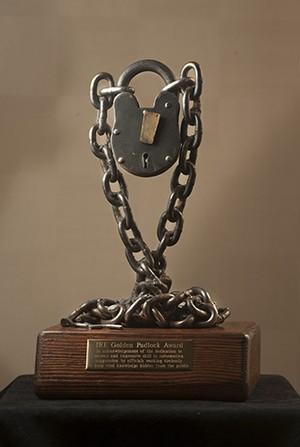If you fill out the "Forgot Password" form but don't get an email to reset your password within 5-10 minutes, please email logistics@ire.org for assistance.
 Investigative Reporters and Editors is proud to announce the finalists for its 2014 Golden Padlock Award celebrating the most secretive government agency or individual in the United States.
Investigative Reporters and Editors is proud to announce the finalists for its 2014 Golden Padlock Award celebrating the most secretive government agency or individual in the United States.
“The spirit of secrecy is alive and well across the United States at all levels of government,” said IRE president David Cay Johnston. “Efforts to hold power to account on everything from the misconduct of judges to executions to a high-profile massacre have been undermined by public servants highly skilled in the art of information suppression. We’re pleased to acknowledge their efforts.”
The nominees are:
The US Navy FOIA office for blocking access to records about a deadly shooting rampage in Washington, D.C. that killed 12 people.
After the September 2013 massacre at the US Navy’s Navy Yard in Washington, D.C., the Navy circled the wagons, especially when WRC-TV reporter Scott MacFarlane submitted FOIA requests for images, videos and security-related memos. The Navy not only blocked the request but Navy FOIA officer Robin Patterson, in an internal memo, detailed an elaborate plan to stymie MacFarlane’s request and others. The memo, which was accidentally released to MacFarlane, triggered an onslaught of media coverage, a written apology to MacFarlane by a Navy supervisor, a lawsuit against the Navy FOIA office and an internal Navy review of the agency’s FOIA procedures. But to this day, the Navy has still not responded to MacFarlane’s FOIA despite numerous requests.
The Department of Justice National Security Division for secrecy bordering on comedy.
What happens when you allow a federal agency carte-blanche power to decide what should and shouldn’t be disclosed as a matter of national security? You get this absurdity from the Department of Justice’s National Security Division: The agency refused to release a document whose secrets are so sensitive that they are on public display at the National Archives. The “TOP SECRET” document in question whose release could threaten “grave harm” to national security? The text of the Fourth Amendment to the U.S. Constitution. The DOJ receives its second straight Golden Padlock acknowledgment for excellence in undermining the public’s right to know following up on last year’s Hall of Shame award for the “Orwellian practice of monitoring journalists’ phone records in pursuit of whistleblowers.”
The VIA Metropolitan Transit system of San Antonio for limiting public access to video incidents recorded on its buses.
After local television station WOAI had reported videos showing VIA bus drivers texting while driving and accidents caused by defective wheel chair lifts, VIA Public Information Coordinator Stephen Andy Scheidt informed WOAI investigative reporter Jaie Avila last October that the public would henceforth have to blindly request all incident reports – “an average of 265 reports per month” – which would first be reviewed by VIA “to determine if any redactions need to be made, and then each page containing the redacted information would need to be printed, redacted, and scanned.”
The West Virginia judicial investigation commission for undermining public access to state judges disciplinary records.
Shining a spotlight on judges is never easy. But in West Virginia, the fight for transparency has gone all the way up to the state Supreme Court. When journalist Lawrence Smith saw a video of a family law judge loudly berating a defendant in his courtroom, the reporter filed a formal request for complaints against that judge, and over two dozen others. The West Virginia Judicial Investigation Commission, responsible for investigating judicial misconduct, refused the request. And in legal submissions, the judges association in West Virginia claimed it would interfere with judicial independence and integrity.
Oklahoma Governor Mary Fallin and Missouri Governor Jay Nixon for secrecy around state executions.
After Missouri announced last year it was making the state's execution drug supplier a legally protected secret, officials began redacting all identifying information in response to freedom of information requests. When journalists eventually learned the name of the hidden supplier, they reported the company was not licensed in the state, had been cited in the past by regulatory agencies and was paid thousands of dollars for its services in cash deliveries by a high-ranking state official. Rather than embracing greater openness and transparency following the revelations, the state again shrouded its new, unknown execution drug supplier in secrecy where it remains today. In April, following a botched execution in Oklahoma, journalists were stonewalled by a law preventing the public from learning the name of the physician overseeing the execution, the supplier of the drugs and the credentials of the medical professional who may have improperly inserted a failed IV line. Under the law, details that could explain the gruesome last minutes of the inmate's life and seek accountability remain hidden from public knowledge.
The winner will be announced at IRE’s national conference in San Francisco June 28. A representative from the winning agency will be invited to receive the honor.
CONTACT:
Robert Cribb, IRE Board Member
416-869-4411
Mark Horvit, IRE Executive Director
573-882-1984

Looks like you haven't made a choice yet.